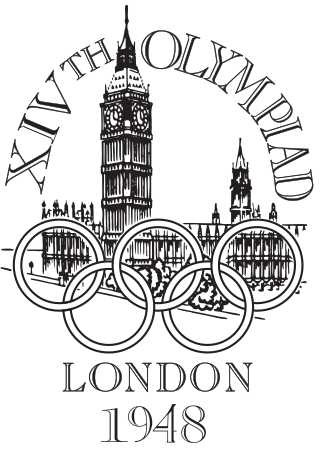
The 1948 Summer Olympics, officially the Games of the XIV Olympiad and officially branded as London 1948, were an international multi-sport event held from 29 July to 14 August 1948 in London, United Kingdom. Following a twelve-year hiatus caused by the outbreak of World War II, these were the first Summer Olympics held since the 1936 Games in Berlin. The 1940 Olympic Games had been scheduled for Tokyo and then for Helsinki, while the 1944 Olympic Games had been provisionally planned for London. This was the second time London hosted the Olympic Games, having previously hosted them in 1908, forty years earlier. The Olympics would return again to London 64 years later in 2012, making London the first city to host the games thrice, and the only such city until Paris and Los Angeles host their third games in 2024 and 2028, respectively. The 1948 Olympic Games were also the first of two summer Games held under the IOC presidency of Sigfrid Edström.

The 1912 Summer Olympics, officially known as the Games of the V Olympiad and commonly known as Stockholm 1912, were an international multi-sport event held in Stockholm, Sweden, between 5 May and 22 July 1912. The opening ceremony was held on 6 July.

The Africa Cup of Nations, commonly abbreviated as AFCON and officially known as the TotalEnergies Africa Cup of Nations for sponsorship reasons, is the main quadrennial international men's association football competition in Africa. It is sanctioned by the Confederation of African Football (CAF) and was first held in 1957. Since 1968, it has been held every two years, switching to odd-numbered years in 2013.

Association football has been included in every Summer Olympic Games as a men's competition sport, except 1896 and 1932. Women's football was added to the official program at the Atlanta 1996 Games.

The Fiji men's national football team is Fiji's national men's team and is controlled by the governing body of football in Fiji, the Fiji Football Association. The team plays most of their home games at the HFC Bank Stadium in Suva.

The United Kingdom has been represented at every modern Olympic Games. As of the 2020 Summer Olympics, it is third in the all-time Summer Olympic medal table by both number of gold medals won and overall number of medals. London hosted the Summer Olympic Games in 1908, 1948 and 2012.
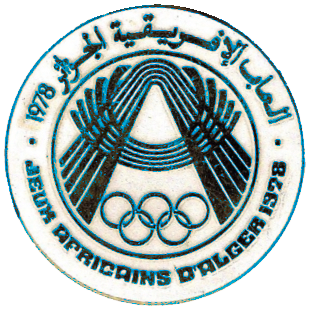
The 3rd All-Africa Games, alson known as Algiers 1978 was a multi-sport event played from 13 to 28 July 1978, in Algiers, Algeria. 45 countries from 49 independent African countries participated in twelve sports.

France competed at the 1928 Summer Olympics in Amsterdam, Netherlands. 255 competitors, 219 men and 36 women, took part in 112 events in 17 sports. At the beginning of the games there was an incident where a French coach was physically assaulted by a Stadium gatekeeper who refused him entry. It boiled over to a point where the entire French team did not participate in the Parade of Nations, and conversations were made to pull out of the games completely. However, the issue was resolved and France went on to compete.

France was the host nation for the 1924 Summer Olympics in Paris. It was the second time that France had hosted the Games, after the 1900 Summer Olympics, also in Paris. 401 competitors, 373 men and 28 women, took part in 128 events in 20 sports.
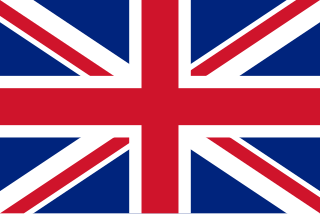
Great Britain, represented by the British Olympic Association (BOA), competed at the 1920 Summer Olympics in Antwerp, Belgium. 234 competitors, 218 men and 16 women, took part in 84 events in 21 sports. British athletes won fourteen gold medals and 43 medals overall, finishing third. It would be the last Olympic Games in which Irish athletes participated for Great Britain, after foundation of Irish Free State in 1922.

Sweden competed at the 1920 Summer Olympics in Antwerp, Belgium. 260 competitors, 247 men and 13 women, took part in 100 events in 18 sports.

The United States competed at the 1920 Summer Olympics in Antwerp, Belgium. 288 competitors, 274 men and 14 women, took part in 113 events in 18 sports.
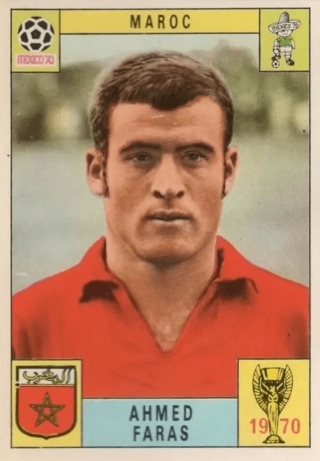
Ahmed Faras is a Moroccan former professional footballer who played as a striker for Chabab Mohammédia at club level and Morocco internationally.
Sport in Papua New Guinea is an important part of the national culture. Rugby league is the most popular sport in Papua New Guinea.
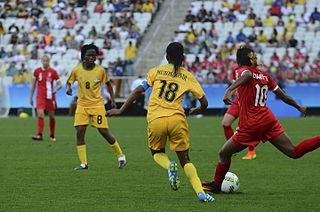
Sport in Zimbabwe has a long tradition and has produced many world recognized sports names and personalities. Football is the most popular sport, although rugby union, cricket, tennis, golf, and netball also have a following, traditionally among the middle class and the white minority. Field hockey is also played widely.

Nigeria national under-23 football team represents Nigeria in international football competitions in Olympic Games. The selection is limited to male players under the age of 23, except during the Olympic Games where the use of three overage players is allowed. The team is controlled by the Nigeria Football Federation. In four appearances at the Olympic Games, the team has won gold in 1996, silver in 2008 and bronze in 2016.

Sports in Nepal comprise both traditional Nepalese and modern international games. Even though there is no exact research and data, the most popular sport in Nepal is cricket followed by football and volleyball. On 23 May 2017, volleyball was also declared as national sport of Nepal. Before 2017, traditional games like dandi biyo and kabbadi were considered as the de facto national games.
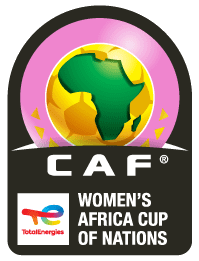
The Women's Africa Cup of Nations (WAFCON), known for sponsorship purposes as the TotalEnergies Women's Africa Cup of Nations and formerly the African Women's Championship, is a biennial international women's football tournament organized by the Confederation of African Football (CAF) since 1998 as the qualification for the FIFA Women's World Cup for African nations. Initially started as a home-and-away qualification competition, it got rechristened as a biennial tournament in 1998 and took on its current name as of the 2016 edition.

Sports in Botswana is diverse and reasonably well-developed. Though football, netball and athletics remain the most popular sports, numerous other sporting codes, including cricket, rugby, judo, swimming and tennis are active in the national sporting landscape. The Botswana National Sport Commission (BNSC), together with the Botswana National Olympic Committee (BNOC) and Ministry of Youth, Sport and Culture (MYSC) are responsible for the overall management of sport in the country. In addition, there over 30 National Sport Federations (NSFs) and three school sport federations
Football at the 2019 Pacific Games was held on 8–20 July in Apia in Samoa.

















